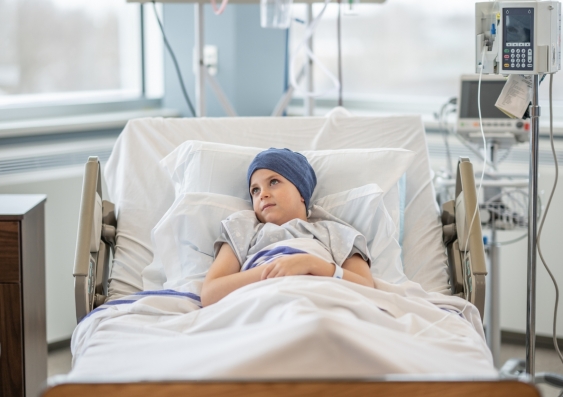Australia's leading precision medicine program for children with cancer is expanding significantly in 2023. Since 2017, ZERO has been led in partnership by Children's Cancer Institute at UNSW Sydney and the Kids Cancer Centre at Sydney Children's Hospital, Randwick. ZERO has offered precision medicine to Australian children with the highest-risk cancers, those who face less than 30 per cent chance of survival.
Now, thanks to the Australian Government and Minderoo Foundation, ZERO is being expanded to be available to children diagnosed with any type of cancer, irrespective of their cancer risk. The expansion will be done in stages, starting with all children diagnosed with brain cancer, then rolling out to all other types of childhood cancers as the year progresses. ZERO includes all nine of Australia’s children’s hospitals as well as 22 national and international research partners.
“The expansion of ZERO to be available to all Australian children with cancer is something we’ve all been working towards for a long time, so it’s extremely exciting to now see it unfolding,” said Professor Michelle Haber AM, Executive Director of Children’s Cancer Institute and Conjoint Professor at UNSW Medicine & Health.
Read more: Childhood cancer precision medicine program shows 'optimistic early results'
ZERO is based on the premise that every child’s cancer is unique. Sophisticated genomic analysis is performed for each child enrolled on the Program, allowing scientists to look for genetic alterations that may be driving the cancer’s growth, then search for drugs capable of targeting those alterations. This information is returned to the clinicians treating the child, to help inform their decision-making.
“Analysing each child’s cancer at a genomic level is providing unprecedented and extremely valuable insights into childhood cancer,” said Prof. Haber. “The more children who participate in ZERO, the more we learn. In this way, children being treated for cancer today are actually helping the children of tomorrow.”
Professor David Ziegler, Chair of Clinical Trials for ZERO, Paediatric Oncologist at Kids Cancer Centre, Sydney Children’s Hospital, Group Leader at Children's Cancer Institute, and Conjoint Professor at UNSW Medicine & Health, said that the precision medicine approach taken by ZERO represents a fundamental change in the way cancer is treated.
“Analysing a child’s cancer at a genomic level can lead to a whole new way of understanding that child’s cancer. This can lead to a more accurate diagnosis, prognosis and risk stratification, and in some cases, a refined treatment approach.”
Professor David Eisenstat, Head of Department, Children's Cancer Centre, The Royal Children's Hospital, Melbourne, said that “ZERO is a truly national program, and all Australian children’s hospitals are playing a critical part. With ZERO now expanding, every Australian child diagnosed with cancer, no matter where they live, will have the opportunity to benefit from precision medicine.
“Here in Melbourne, we have several children who have benefited from targeted therapies identified through ZERO, including Kristian Kozul. Kristian has an aggressive brain cancer and without the targeted therapy ZERO identified, it is unlikely he would have survived. To see him doing so well today is beyond all our expectations.”
Read more: Potential treatment advance for aggressive childhood cancer revealed
Kristian Kozul was just 15 months old when he began having seizures. No one could determine what was wrong with Kristian until a biopsy at the Royal Children’s Hospital led to the diagnosis of cancer − a rare brain tumour known as anaplastic astrocytoma. Kristian began intensive treatment. However, after five months of chemotherapy, the aggressive tumour had not shrunk but instead had grown bigger.
Kristian was given less than a year to live − a devastating prognosis for a young child. With Kristian being too young for radiation, and having no other options available to them, his parents agreed to him doing a genetic sequencing test as part of the Zero Childhood Cancer Program.
The test was successful in identifying a rare genetic mutation and in November 2017, Kristian, then two years old, was enrolled in a clinical trial open at Sydney Children’s Hospital to test a drug targeting that same mutation. After just weeks of treatment, an MRI scan showed that his tumour had stopped growing.
Today, more than five years later, Kristian is not only alive but is thriving. He has started school and is enjoying life to the full.
“Kristian continues to grow and develop each day. He has come such a long way and continues to amaze us,” said Kristian’s mum Maria.
“We know that if it wasn’t for ZERO, our little boy wouldn’t be with us today, and we couldn’t be more grateful.”
Minderoo Foundation has supported ZERO since 2017, and has partnered with the Australian Government, through the Department of Health’s Medical Research Future Fund, to jointly provide $67 million of funding to expand the Program to all young Australians with cancer.
The Zero Childhood Cancer clinical trial is sponsored by the Australian and New Zealand Children’s Haematology and Oncology Group (ANZCHOG).


